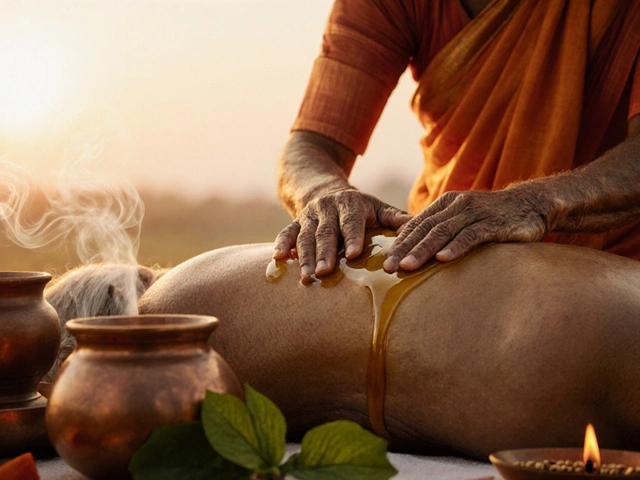People swear by Ayurveda. Some say it healed their chronic pain. Others say it made them sicker. So what’s the truth? Is Ayurveda good or bad for you? The answer isn’t simple. It’s not magic. It’s not a scam. It’s a 5,000-year-old system of medicine that works for some people, fails for others, and can be dangerous if misused.
What Ayurveda Actually Is
Ayurveda isn’t just herbal teas and massage oils. It’s a full medical system from ancient India that looks at your body type, lifestyle, diet, and environment to find the root cause of illness. The core idea is balance - between three energies called doshas: Vata, Pitta, and Kapha. Your unique mix of these determines your health patterns.
Unlike modern medicine that often treats symptoms, Ayurveda tries to fix why you’re unwell. A person with digestive issues might not just get antacids. They might get a customized diet, daily routines, yoga, and detox practices called Panchakarma. It’s personalized. It’s slow. And it’s not always backed by modern science.
The Good: Where Ayurveda Works
For mild, long-term issues, Ayurveda can be surprisingly effective. A 2023 study from the All India Institute of Medical Sciences found that Ayurvedic treatments helped reduce joint pain and stiffness in people with osteoarthritis better than placebo over 12 weeks. Many patients with chronic stress, insomnia, or digestive problems report real improvements after following Ayurvedic routines for even a few months.
Herbs like Ashwagandha, Turmeric, and Triphala have been studied in labs and clinical trials. Ashwagandha lowers cortisol - the stress hormone - as effectively as some prescription anti-anxiety meds, according to a 2024 meta-analysis in the Journal of Alternative and Complementary Medicine. Turmeric’s curcumin reduces inflammation markers in arthritis patients. Triphala improves gut motility and reduces constipation.
What makes Ayurveda stand out is its focus on prevention. Daily oil massage (abhyanga), tongue scraping, eating seasonally, and sleeping before 10 PM aren’t just rituals. They’re tools to keep your body in rhythm. People who stick with these habits often report better sleep, clearer skin, and more energy - not because of one miracle herb, but because they stopped living out of sync with their bodies.

The Bad: When Ayurveda Goes Wrong
Here’s the dark side: not all Ayurvedic products are safe. A 2022 report from the FDA found that 20% of Ayurvedic supplements sold in the U.S. contained toxic levels of lead, mercury, or arsenic. These metals don’t come from herbs. They’re accidental contaminants - or worse, added intentionally in some traditional recipes to "enhance potency."
In India, the problem is worse. A 2021 study from the Indian Council of Medical Research tested 100 Ayurvedic medicines bought from local pharmacies in Mumbai and Pune. Over 40% had heavy metals above WHO safety limits. One brand of "memory booster" had lead levels 12 times higher than the safe daily intake.
Another risk? Delaying real treatment. A woman in Bangalore was told by an Ayurvedic practitioner that her breast lump was just a "Kapha imbalance." She avoided mammograms for 14 months. By the time she went to a hospital, the cancer had spread. Ayurveda isn’t a replacement for cancer screening, antibiotics, or emergency care.
Also, don’t assume "natural" means safe. Some Ayurvedic herbs interact dangerously with prescription drugs. Ashwagandha can lower blood pressure too much if you’re already on beta-blockers. Licorice root can cause heart rhythm problems if you have high blood pressure. And Panchakarma - the intense detox process - can be harmful if done by untrained practitioners or if you’re pregnant, elderly, or have kidney disease.
Who Should Avoid Ayurveda?
Not everyone should try Ayurveda. Here’s who needs to be careful:
- People on blood thinners, diabetes meds, or heart medication - herb interactions are common and serious
- Pregnant or breastfeeding women - many herbs cross the placenta or enter breast milk
- Children under 12 - their bodies process herbs differently, and dosages aren’t well studied
- People with liver or kidney disease - herbs are processed by these organs; extra strain can cause damage
- Anyone with a serious diagnosis like cancer, heart failure, or autoimmune disease - don’t replace conventional treatment
If you have any of these conditions, talk to your doctor before trying Ayurveda. Don’t rely on a shopkeeper’s advice or a YouTube guru.

How to Use Ayurveda Safely
You don’t have to give up Ayurveda. You just need to use it wisely.
- Only buy from certified brands - look for AYUSH (Ayurveda, Yoga, Naturopathy, Unani, Siddha, and Homoeopathy) certification on the label. Avoid products with no ingredient list or manufacturer details.
- Consult a qualified practitioner - not a spa therapist or a yoga teacher. Find someone with a BAMS degree (Bachelor of Ayurvedic Medicine and Surgery). In India, they’re licensed by the government.
- Start slow - try one herb at a time. Don’t mix five supplements and expect results.
- Track your body - note changes in sleep, digestion, energy, mood. If you feel worse, stop.
- Keep your doctor in the loop - tell them what you’re taking. Bring the bottle to your appointment.
Simple Ayurvedic habits - like drinking warm water with lemon in the morning, eating dinner before 8 PM, or doing 10 minutes of breathing exercises - are safe for almost everyone. These aren’t magic. They’re just good habits dressed in tradition.
The Bottom Line
Ayurveda isn’t good or bad. It’s a tool. Like a hammer, it can build a house or smash a window. Used right, it can help you feel better. Used wrong, it can hurt you.
If you’re looking for quick fixes, Ayurveda isn’t for you. It doesn’t cure diabetes overnight. It doesn’t make you lose 10 kilos in a week. But if you’re tired of treating symptoms and want to understand why you feel off, it might give you the answers modern medicine overlooks.
The key is balance. Use Ayurveda as a complement - not a replacement. Respect its depth. But don’t ignore science. And never let tradition blind you to danger.
Is Ayurveda scientifically proven?
Some parts are. Herbs like Ashwagandha, Turmeric, and Triphala have been studied in clinical trials and shown to reduce stress, inflammation, and constipation. But many Ayurvedic practices - like dosha typing or Panchakarma - lack large-scale scientific validation. Ayurveda isn’t fully proven as a system, but individual components have evidence.
Can Ayurveda cure cancer?
No. There is no credible scientific evidence that Ayurveda can cure cancer. Some herbs may help manage side effects of chemotherapy, like nausea or fatigue, but they do not kill cancer cells. Relying on Ayurveda instead of surgery, radiation, or chemotherapy can be deadly. Always follow your oncologist’s advice.
Are Ayurvedic supplements regulated in India?
Yes, but enforcement is weak. The AYUSH ministry sets standards, but many manufacturers bypass them. A 2021 study found over 40% of Ayurvedic products sold in major Indian cities contained unsafe levels of heavy metals. Look for the AYUSH certification mark, buy from trusted brands, and avoid street vendors or unbranded powders.
Can I take Ayurveda with my regular medicine?
Maybe - but don’t assume it’s safe. Ashwagandha can lower blood pressure too much if you’re on beta-blockers. Licorice can interfere with heart meds. Turmeric can thin your blood. Always tell your doctor what Ayurvedic products you’re using. Bring the bottle to your appointment. Never mix them without professional advice.
How long does it take for Ayurveda to work?
It varies. For stress or digestion, you might feel better in 2-4 weeks. For chronic conditions like arthritis or hormonal imbalance, it can take 3-6 months. Ayurveda works slowly because it targets root causes, not symptoms. If you don’t see changes after 3 months, reassess your approach or consult a qualified practitioner.





